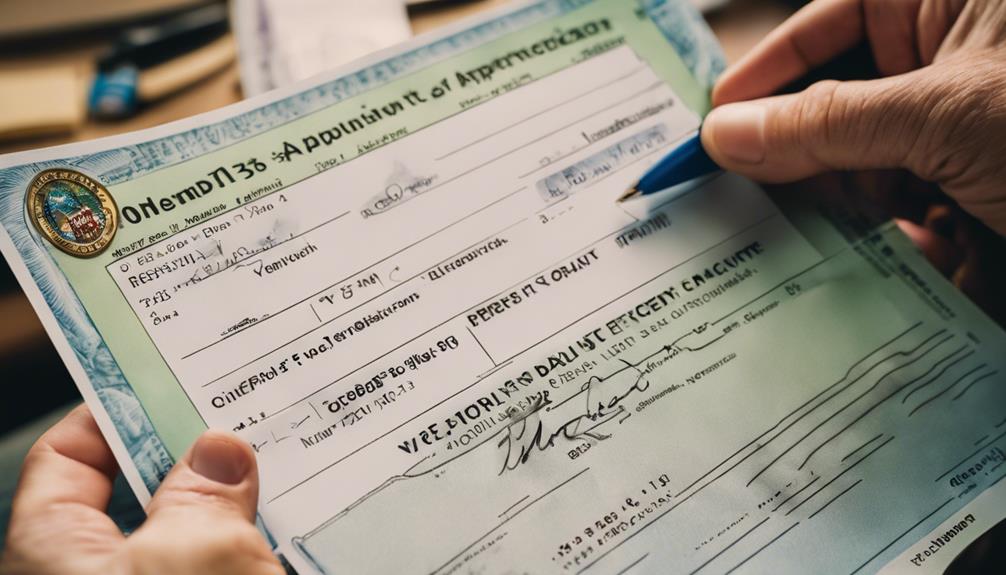The key documents for a Vermont Emergency Medicaid application include proof of income, assets, residency, identity, medical necessity, and the emergency situation. These documents are crucial for verifying eligibility during a medical crisis in Vermont. Each category plays a significant role in determining qualification for emergency Medicaid assistance, ensuring that individuals meet the necessary criteria for coverage. By compiling these documents accurately, applicants can strengthen their case for receiving the needed medical support in times of emergency.
Eligibility Criteria

When determining eligibility for Vermont Emergency Medicaid, specific criteria must be met to qualify for assistance. The application process for Vermont Emergency Medicaid involves meeting certain eligibility requirements, including income limits. Applicants must provide required documentation to prove their eligibility for the program. Income limits are set based on the Federal Poverty Level (FPL) guidelines, which determine the maximum income a household can earn to qualify for assistance. Applicants must submit proof of income, assets, and household size to demonstrate their financial need.
To qualify for Vermont Emergency Medicaid, individuals must meet specific eligibility requirements, such as being a resident of Vermont and having a medical emergency that requires immediate attention. Additionally, applicants must not be eligible for regular Medicaid or other health insurance coverage.
Meeting these criteria is essential for determining eligibility for Vermont Emergency Medicaid and receiving the necessary healthcare assistance during times of medical crisis.
Proof of Identity
Verification of identity is a crucial step in the application process for Vermont Emergency Medicaid, ensuring that applicants' personal information is accurately documented. To establish identity, applicants typically need to provide a valid government-issued photo ID, such as a driver's license.
In cases where a driver's license is not available, a birth certificate can serve as an alternative form of identification. The birth certificate provides essential details about an individual, including their full name, date of birth, and place of birth, which are crucial for verifying identity.
Having a clear and valid proof of identity is essential for the Vermont Emergency Medicaid application process to prevent identity fraud and ensure that the benefits reach the intended individuals. By requiring documents like a driver's license or birth certificate, the program can maintain the integrity of its services and accurately identify and assist those in need.
Applicants should ensure that the provided identity documents are current, unexpired, and legible to expedite the verification process.
Income Verification

Effective management of Vermont Emergency Medicaid applications necessitates a thorough assessment of applicants' income through a systematic verification process. Asset verification plays a crucial role in this process, requiring applicants to provide documentation showing their assets such as bank statements, property deeds, and investment records. This verification ensures that applicants meet the income thresholds set for Emergency Medicaid eligibility.
Employment verification is another essential aspect of income verification for Vermont Emergency Medicaid applications. Applicants are typically required to submit proof of employment, such as recent pay stubs or employer verification letters. This documentation helps confirm the applicant's current income and employment status, aiding in the determination of their eligibility for Emergency Medicaid benefits.
Residency Documentation
How does the verification of residency play a crucial role in the determination of eligibility for Vermont Emergency Medicaid applications?
Residency documentation is a key component in the assessment of eligibility for Vermont Emergency Medicaid. Applicants are typically required to provide proof of residency through various means such as address verification, residency affidavits, utility bills, or lease agreements.
Address verification is commonly accepted in the form of utility bills showing the applicant's name and address, demonstrating that they reside in Vermont. Additionally, lease agreements can serve as concrete evidence of residency, especially for individuals living in rental properties. Residency affidavits, where a third party attests to the applicant's residency, can also be utilized to support the residency claim.
Ensuring that applicants meet the residency requirements is essential for the proper allocation of Vermont Emergency Medicaid benefits.
Medical Necessity

Residency documentation serves as a foundational component in determining eligibility for Vermont Emergency Medicaid applications, with the next critical consideration being the evaluation of medical necessity.
When assessing medical necessity for Medicaid coverage, it is imperative to rely on thorough medical records. Medical records play a crucial role in demonstrating the need for emergency Medicaid assistance. These records should clearly outline the medical condition, treatment plan, and the urgency of the situation to justify the need for immediate coverage. Medicaid coverage decisions are often based on the information provided in these medical records, highlighting the importance of accurate and detailed documentation.
The evaluation of medical necessity involves a comprehensive review of the individual's medical history, current condition, and the urgency of the situation. It is essential to present all relevant medical records that support the need for emergency Medicaid coverage. By providing comprehensive and detailed medical records, applicants can strengthen their case for receiving the necessary assistance during medical emergencies.
Emergency Situation Documentation
An essential aspect of the Vermont Emergency Medicaid application process is the documentation required to demonstrate the emergency situation that necessitates immediate medical assistance. Supporting documents play a crucial role in substantiating the emergency circumstances that justify the need for urgent medical care. Required paperwork should clearly outline the critical situation faced by the individual seeking emergency Medicaid coverage.
To provide evidence of the emergency situation, individuals may need to submit medical records, physician's notes, hospital discharge summaries, and any relevant test results. These documents serve as tangible proof of the severity of the medical condition and the necessity for immediate intervention. Additionally, a detailed description of the events leading up to the emergency can further strengthen the application by providing context to the situation.
In essence, the emergency situation documentation is fundamental in establishing the urgency and critical nature of the medical need, ensuring that individuals receive the timely assistance they require through Vermont Emergency Medicaid.
Additional Information

Supplementary details regarding the emergency situation may be requested to provide comprehensive context for the Vermont Emergency Medicaid application. When navigating the application process, ensuring the completion of all required forms accurately is crucial. It is imperative to include all supporting documentation that substantiates the emergency need for Medicaid assistance. Such documentation may include medical records, proof of income, residency verification, and any other relevant paperwork.
Moreover, understanding and adhering to submission deadlines is paramount. Missing these deadlines could result in delays or even denial of the application. Therefore, applicants must be vigilant in meeting all specified timelines to facilitate a prompt review of their case.
Any additional information requested by the Medicaid authorities should be provided promptly and accurately to avoid any unnecessary complications in the processing of the application. By meticulously following the guidelines regarding required forms, supporting documentation, and submission deadlines, applicants can enhance their chances of obtaining the emergency Medicaid assistance they urgently need.
Conclusion
In conclusion, the essential documents required for a Vermont emergency Medicaid application serve as crucial evidence to determine eligibility and ensure appropriate healthcare coverage for individuals in urgent medical need.
By submitting thorough documentation, applicants can navigate the application process efficiently and effectively.
The stringent requirements underscore the importance of proper documentation to access emergency Medicaid benefits, highlighting the complex nature of healthcare access and delivery in emergency situations.
